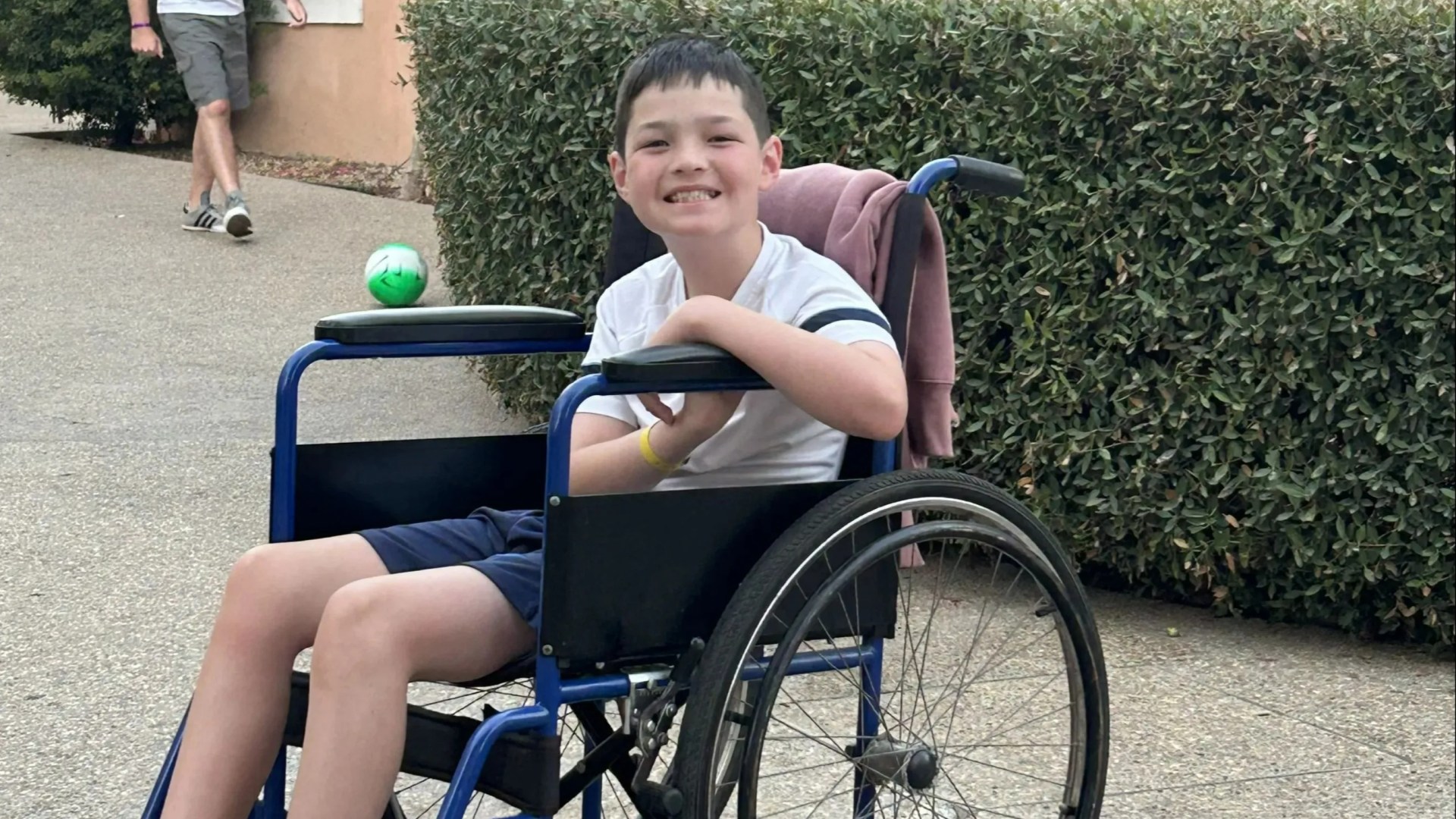A BRAVE schoolboy has been diagnosed with a rare condition which will tragically leave him unable to walk and speak.
Doctors initially diagnosed Leo Powell, 11 with dyspraxia – a condition which impacts movement – when he was eight years old, after struggling to perform certain exercises during a Joe Wicks follow along in 2020.
4

4

4
But after his symptoms worsened, parents Kelly and Chris feared it was something more serious, DevonLive reported.
Kelly, 36, who has two other children, Braiden, 18, and Emmie, 10, said: “I knew he was getting worse but dyspraxia is not meant to.”
Finally in September this year, Leo, from Devon, got his true diagnosis, Friedreich’s Ataxia, a progressive condition that affects the nervous system and muscles.
The disorder affects one in 40,000 to 50,000 people and typically those aged between 10 and 15.
Those affected will have a shorter life expectancy than their peers and will spend much of their life in a wheelchair.
At the moment, Leo has limited mobility and can walk short distances, while he is on the waitlist for a wheelchair and walker.
He cannot walk long distances, as he feels overwhelmed with spasms all over his body.
Kelly recalled: “Leo had not seen anyone medically since his diagnosis of dyspraxia nearly three years ago, and he was getting worse.
“He had walked home from school on his own he fell into someone’s front garden wall and smashed the side of his face.
“He also looked like he had a curve in his spine, had flat feet and would get spasms.
“He received his formal diagnosis on September 11. By then, we were 99.9 per cent sure he had FA, but the 0.01 per cent of hope we were holding onto was completely shattered.
“It’s like the lottery you don’t want to win.
“Leo is like my little best friend. It was really hard because you spend all your life trying to protect your children and then something like this happens and you can’t. I didn’t want it to be FA.”
‘WALKING DRUNK’
Kelly said that she first noticed Leo’s struggles in 2019, when he began to walk ‘strange’ and started leaning on one side as if he was ‘drunk’.
The mum-of-three also noticed he was very flexible and would sit in a ‘weird’ way with his legs behind his head, like a ‘pretzel’.
She says: “He watched TV and went on his PlayStation like that. He had balance issues, and walked like he was drunk.”
Kelly had expressed her concerns to his primary school, who she claims dismissed them as he was doing well academically.
We know what’s coming; we just don’t know when
Kelly Powell
But after seeing Leo ‘really struggling’ with starjumps during the Wicks workout, the mum-of-three made a doctor’s appointment in 2020.
Kelly said: “In the warmup, one of the things were star jumps. We noticed he was really struggling, arms and legs everywhere, he didn’t look like a star. It looked really wrong.
“In comparison to seeing his little sister, who is 14 months younger than him and was doing it perfectly, we found it hilarious. We all laughed, but that’s when I noticed something wasn’t right.”
After being seen by a physiotherapist, Leo was diagnosed in 2021 as having dyspraxia – until his symptoms worsened.
Kelly’s mum worried it was Friedreich’s Ataxia, which she had never heard of before.
In February 2024 Leo was seen by a paediatrician and underwent multiple tests at hospital, including an MRI scan, hearing, and eye tests.
Kelly received the ‘heart-sinking’ diagnosis on 24 May 2024, including a diagnosis of scoliosis, kyphosis and peripheral neuropathy, resulting from the condition.
Kelly said: “My heart sank when they told me, I cried night and day, silently screaming to myself thinking how am I going to tell him.
“How to tell an 11-year-old he could be in a wheelchair for the rest of his life?”
HOPE FOR FUTURE
Kelly revealed what the the future will look like for her brave son, and revealed the tragic extent of his deterioration in the past year.
She continued: “Eventually he will lose his mobility because he is losing the connection between his brain and muscles which is very similar to motor neurone disease (MND).
“It will affect his pancreas so he will likely get diabetes. All his muscles will be affected, including his heart, but thankfully he is showing no signs of that yet.
“Eventually it will affect his speech and eyes and he already has very limited mobility. In the last 12 months it has gotten so much worse and he is suffering more with fatigue and spasms.”
The mum-of-three is hoping Leo will be eligible for a medication called omaveloxolone (Skyclarys), which could slow the progression of the disease.
It is available in the EU and USA, but has not yet been approved in the UK but potentially could be by 2026.
However, if made available, Leo will need to wait five more years before he can qualify.
She says: “A specialist doctor in Sheffield has told us it could delay Leo needing to be confined to a wheelchair.
“To pay for the medication ourselves would cost over £30,000 just for a month’s supply. I would imagine it would be much cheaper than that for the NHS.
“A cure could be gene replacement therapy but that’s only in stage two of research trials.
“In the meantime, we could wait for the NHS to give Leo a walker, or we can raise the money to buy one and pay privately for physiotherapy or personal training sessions.
“We don’t know how fast his progression will be but it has gotten worse since this time last year. We know what’s coming; we just don’t know when.”
A fundraising page has been set up to help fund Leo’s treatment and has already received over £2,500 in donations.

4
What is Friedrich’s ataxia?
Friedreich’s ataxia is the most common type of hereditary ataxia (caused by genes you’ve inherited). It’s thought to affect at least 1 in every 50,000 people.
Symptoms usually first develop before the age of 25, although it can develop in people much older than this.
Signs and symptoms of Friedreich’s ataxia can include:
- problems with balance and co-ordination, often causing wobbliness, clumsiness and frequent falls
- increasingly slurred, slow and unclear speech (dysarthria)
- increasing weakness in the legs – many people find walking difficult and need to use a wheelchair after around 10 to 20 years
- difficulty swallowing (dysphagia)
- abnormal curvature of the spine (scoliosis)
- total or partial vision loss and hearing loss
- diabetes
- thickening of the heart muscles (hypertrophic cardiomyopathy), which can cause chest pain, breathlessness and an irregular heartbeat
- loss of sensation in the hands and feet (peripheral neuropathy)
The symptoms of Friedreich’s ataxia usually get gradually worse over many years. People with the condition tend to have a shorter life expectancy than normal. Many people live until at least their 30s, and some can live into their 60s or beyond.
Source: NHS




